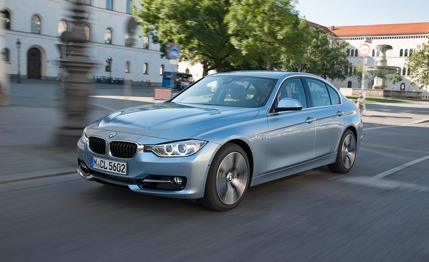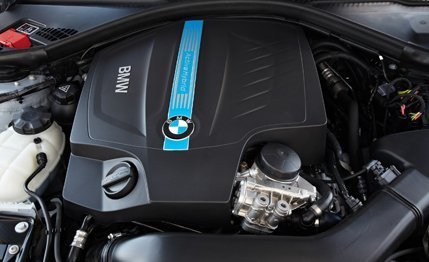
 First Drive Review
First Drive Review
Like all the German carmakers, BMW has a preference for diesel power over hybrids in the search for improved fuel efficiency. But America—a pretty huge market, as you may have noticed—is crazy for gas-electrics, as are parts of Asia, so the Bavarians have spun off hybrid versions of their mainstream sedans.
The ActiveHybrid 3—or “3-series hybrid” to those who prefer nomenclature that’s not fairly dripping with marketing goo—uses BMW’s 300-hp, 3.0-liter turbocharged six, coupled to a ZF eight-speed automatic in which the torque converter has been replaced by a 55-hp electric motor. Add a clutch between the electric motor and internal-combustion engine, and you have all the go bits. It’s the same gasoline-electric system in the ActiveHybrid 5, and it is also being adopted for the repositioned 2013 ActiveHybrid 7.
Batteries Included
Power for the electric motor comes from a 1.3-kWh lithium-ion battery pack made from 96 cylindrical cells from supplier A123 Systems; the stack is mounted below the trunk floor. The 317-volt battery, which weighs 101 pounds with its internal cooling apparatus, can also power the electric air-conditioning compressor. Feeding juice into the battery pack is the work of the electric motor, which acts as a generator during braking and coasting. A pair of conventional 12-volt batteries is aboard. One is devoted to energizing the engine starter, the other to various other electrical systems that include the electric power steering and the brakes.


The gasoline engine and the electric motor produce a combined output of 335 ponies, as well as 332 lb-ft of torque—35 and 32 more than developed by the conventionally powered 335i. However, the hybrid’s hardware puts it 298 pounds above the weight of a 335i sedan, and the green-leaning car’s final-drive ratio has been lengthened from 3.15 to 2.81 in search of fuel economy.
Not Slow—but Not Terribly Efficient, Either
As a result, we estimate the 3-series hybrid will hustle to 60 in five seconds flat—not slow by any means, but 0.1 second off BMW’s own claim for a 2013 335i automatic. (The 2013 335i auto will be recalibrated for less torque interruption during shifts compared with the 2012. We also typically find BMW acceleration estimates to be conservative.) At 33 mpg, highway fuel economy is unchanged from our benchmark 335i automatic, but city mpg climbs up two to 25. A 328i can achieve as high as 23/34. We’re curious to see what we measure in real-world driving with the hybrid.